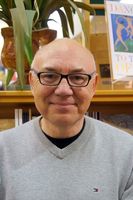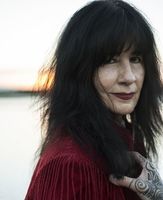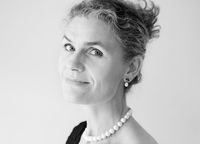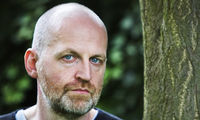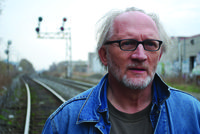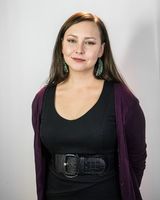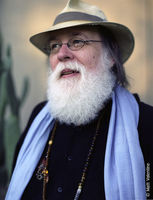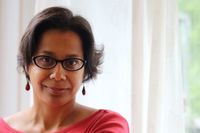Special Feature! Talking About Poetry with the Griffin Prize Finalists
The Griffin Poetry Prize is a career-making honour, and has built itself into one of the most prestigious literary prizes in the world, honouring the best in both Canadian and international poetry for 15 years. Past winners and nominees include icons like Anne Carson, Paul Muldoon, and P.K. Page.
Today we're excited to present a conversation with all nine finalists, including translators Per Brask and Patrick Friesen: Ulrikka S. Gernes, Liz Howard and Soraya Peerbaye, nominated for the Canadian prize, and Norman Dubie, Joy Harjo, Don Paterson and Rowan Ricardo Phillips, nominated for the International prize.
Each finalist for both the international and Canadian prizes receives $10,000 in recognition of the literary excellence of their work, with the two winners receiving an additional $65,000.
This year's winners will be announced at an event in Toronto on June 2, 2016, after a decision is reached by judges Alice Oswald, Tracy K. Smith, and Adam Sol.
On June 1, the nominees will read from their shortlisted works in Toronto. While tickets for the event are sold out, you can listen to a livestream of the event on the Griffin Prize website at 7:30pm EST.
In our conversation below, Liz Howard tells us why it's not easy to be honest; we see an iconic Canadian poet pop up twice as recommended reading (including a link to one of her most beloved pieces); and Norman Dubie shares a vampiric writing schedule.
For full information on the 2016 nominees, check out our shortlist announcement post here.
______________________________________________________________________
Open Book:
Tell us about your nominated collection and how the project originated for you.
Per Brask:
In the late summer of 2012, a month before Ulrikka S. Gernes’s collection came out in Denmark she sent it to me in a PDF. Patrick Friesen and I had edited and translated a collection of her work back in 2001, published by Brick Books. I quickly fell for this new collection of Ulrikka’s and emailed Patrick to ask him if he’d like to work on it with me. He said yes and we got down to work.
Your CanLit News
Subscribe to Open Book’s newsletter to get local book events, literary content, writing tips, and more in your inbox
Norman Dubie:
The Quotations of Bone as a volume of poetry had an early organization wildly dependent on two disparate, heavy instructions. The first was an aging voice of a woman who had lost her brother in Vietnam and a sister and father to suicide. This voice and this family had been visiting me for ten years but I resisted writing the poem. The other force working in the book is easily tracked to the British Petroleum spill in the Gulf: fragmentary letters from a friend in Louisiana created a mindset for me which grouped some of these poems in not always obvious terms. The closing poem in the book worries about a first strike capacity that exists in an installation concealed in the Ural Mountains of Russia and in a trench along the southern coast of China. Pax.
Patrick Friesen:
Per Brask approached me well over a decade ago about translating some Danish poets. That’s how it got started. We translated a book by Gernes in 2001, and this is the second we’ve done. The collection is interesting in how Gernes moves through territories of the mind, through time. In that sense there is a surrealistic quality to the book, the poems can shift wherever they need to without setting up boundaries. And, yet, one follows the motion because of the imagistic associations and the rhythms. I think there are certain writers who very clearly reveal their minds at work in their writing. I think of someone like Virginia Woolf; her novels are less about characters and plots, than they are about ideas and the working of a mind. Gernes’ poems do that as well.
Ulrikka S. Gernes:
Well, the time had come. Seven years had gone by since my previous collection of poetry. Something had to happen. Poets write poems and collect them in collections. So, I gathered all my attempts, the half-finished poems, the poems I thought finished, the weird and mostly incomprehensible notes, gathered it all from folders and drawers and started digging my way through the material to find some kind of valid statements, trustworthy expressions, compelling images, rhythms and cadences that would point in various directions, and I would go that way or the other to investigate further, and little by little the collection Frayed Opus for Strings & Wind Instruments started to appear as an assembly, as a whole. That was in Denmark and in Danish. [It was published as Flosset opus for strygere & blæsere in Denmark.] I emailed the finished manuscript to Per Brask who was on a road trip in the Arizona desert. It obviously tickled him enough to start translating it into English in close collaboration with Patrick Friesen. The manuscript was accepted by Brick Books. The result of Per Brask's and Patrick Friesen's fine work is what Canadian readers can enjoy, and it is ultimately their fine work that brought about the nomination; the magic of translation...
Joy Harjo:
The cover art by tribal member Solomon McCombs shows a one pole stickball game, a traditional game we Mvskoke people still play. The original purpose is to solve conflict and that still holds true. The title and title poem were inspired by a Navajo friend Norman Brown’s comment that we are all holy beings, hence the title Conflict Resolution for Holy Beings. Earth exists within a system of polarity. We are always balancing.
Liz Howard:
What interests me most about this question is the subject “us” that is proffered up as the “to whom” that I am to address in an account of my book. As in, “To whom this may concern.” Who concerns themselves with reading this and what can I say that will be of interest or at least intelligible? It’s possible that I began writing poetry because I am so obsessively analytical and poetry has provided me with a space for dwelling within indeterminacy. The indeterminacy I have been marked by my entire life. So my book is about this indeterminacy, fundamentally. About the still relatively unknown nature of consciousness, of what it is to have a “self”, that it may not simply be singular, of trying to educate myself in the Anishinaabe traditions and philosophy that were systematically stripped from my ancestors and at the same time trying to understand my settler origins. It’s about the mystery of my lineage, the disappearance of my birth father, about the fact that I’ve never felt that I’ve understood anything correctly. It’s about northern forests, environmental destruction, and the streets of Toronto. It’s about poetry as a way to know inside unknowing, a somehow divinatory precursor, a Shaking Tent. It’s about a girlhood of poverty, a womanhood of introspection, trauma, and the drive to discover the possibility of pleasure within the problematics of late Capitalism. It’s about the bodies of sister animals, symbiosis, and the desire for a better life. Poetry has given me a better life and I’m grateful. As for how the project originated I’ll say that perhaps what I’ve written is still ongoing and it is the project of a life that hopefully will continue. This is my first book, my first testament, and I hope for the possibility of more.
PS: Also this quote from Ariana Reines’ The Cow: “It is not easy to be honest because it is impossible to be complete.”
Don Paterson:
I’ve been writing sonnets for years, and I’ve previous published a version of Rilke’s Sonnets to Orpheus, as well as a critical book on Shakespeare’s Sonnets. So I decided — I think I decided, but in art most ‘decisions’ are retrospectively applied —¬ that maybe the natural thing was to see what would happen if I wrote nothing but sonnets for a while. Understandably, all this can get you a reputation as a something of a ‘sonnet-lover’ (I have the same issue with the aphorism), but I’m really not. In a way it’s almost the opposite: what I like about the sonnet is actually my own indifference towards the form as anything but a means to an end. Lord knows, there’s no intrinsic merit in a poem being a sonnet. But I find that these little square boxes fish weird things from my unconscious, and it’s the one form I feel I’ve practiced into enough fluency to forget. If you know the form in your bones, you can improvise inside it while being barely aware of it: it’s really just a 12-bar blues. You make a statement, you say something else, and then you resolve the two things, often in an emergent’ way which surprises you. It's a way of discovering meaningful connections between apparently distant things — ones you suspected were there, but were unable to express.
Soraya Peerbaye:
Tell: Poems for a girlhood is a response to the murder of Reena Virk, and the subsequent trials of the young people implicated in her death. I wrote it because I was deeply disturbed by certain elements of the trials; the invisibility of racism, of gender and beauty norms as operatives; but also, the invisibility of Reena Virk herself. Reena’s body was in the Gorge Waterway for eight days before being found. The trials themselves revolved around issues of what was visible in moonlight; in night and shadow; on dark skin. In testimony, Reena was visible as little more than a body receiving their violence; the witnesses were unable to acknowledge her agency or even her fear. And beyond the trials, the invisibility of the history of colonial violence, even as it was in the landscape.
The project is an attempt to see what the young people saw, to see what they turned their eyes away from, what they were transfixed by. It isn’t so much about “filling in the picture”, as it is about holding the fragments, holding an image that is disintegrating over time.
Rowan Ricardo Phillips:
Heaven is a book that chose me more than I chose to write it. I had been reading Dante’s Paradiso while thinking about what ideas of Paradise and Heaven mean to us both in a high-minded sense and in a colloquial sense. We talk more often about being in better places, or hoping to be in better places than it may seem. The book is the mind’s travel through the better and worse parts of that terrain. My prior book was titled The Ground. If that book was more earthbound, then Heaven is a book with an untethered imagination; the mind in a cloudbank.
OB:
Are there images or themes you notice recurring in your work? If so, what are they?
PB:
I translate a wide variety of texts — poetry, fiction, drama, philosophy and what they have in common is that they in one way or another have made me think and feel new things. I also like to work with a co-translator. Patrick and I have now published five co-translated collections. I enjoy working with him because A) we have a lot of fun working together, B) he’s a fabulous poet, C) he has a knack for fitting meaning with rhythm, D) his sensitivity to the musicality of language (both the source and the target) is very strong. I also find that a third personality appears when we work together, neither Patrick nor me, but some third entity. I find that fascinating and it usually makes the poems we work on better.
ND:
For nearly fifty years now I have been visited as a poet by rather desperate speeches belonging to other people and other times. This is the sort of ventriloquism that served the final days of Vaudeville where the dummy in the ventriloquist’s lap would leap onto the floor, tossing the wooden, straw corpse of the ventriloquist over his shoulder, dragging it off stage to hoots and hollers. Wasn’t this called the Jimmy-game? It worked rather ironically along with Mr. Interlocutor and a dialect uprising that early on subverted the traditional Cakewalk. This sounds like I began as a boy inspired by John Berryman’s Homage to Mistress Bradstreet and matured from there not in the Browning version or shade.
UG:
Oh, how many moons was I actually allowed? Are there any moons left or have I used them all up? Longing is one of my more well trained muscles; also losing and being lost; You — whoever you are, you know who you are, I know who you are, you are sometimes me, sometimes you, you are gone, you are here, you in abundance, you ad libitum, you, no one but and no one else... and then this: being right here at this exact place in the Universe, right now. Whatever that means. Poetry is primary research.
JH:
Transformation emerges as a major theme as well as an awareness of opposition(s). My most noted poem, “She Had Some Horses” the closing lines are: “she had some horses she loved/she had some horses she hated/these were the same horses.” How do we hold contradictions together in the same place, the same mind? This appears to be the human condition.
LH:
I use recurrence as a deliberate “strategy” in this book in the form of what I call recombinative sonnets. Each line of a sonnet is composed using content from the first 14 poems of the book, in order (i.e., line 1 is pulled from poem 1 and so on). This creates a core sample or even a kind of tree ring analysis of the first section of the book.
In addition the following matters reoccur: rivers, lakes, moss, pollutants, skulls, belief, rabbits, mothers, fathers, death, cognition, lichen, Western philosophy, Anishinaabemowin, doubt, berries, time, neurochemicals, heaven, dreams, blood, selves and others…
DP:
I’m not big on images — I don’t think my mind is very visual — and I like the movement through time and space in a poem to be quite dynamic; I worry that the visual is sometimes privileged at the expense of the language of abstract thought and feeling. But if by ‘image’ we mean ‘thing’ (I suspect we often do) — then… probably! But I’d hate to think about it. Same with themes. The poet is the usually last person to be able to identify what these really are anyway. You can always identify the ‘subject matter’, but in poetry ‘subject matter’ is usually just a pretext to write about something else. But I suspect I’m pretty old school — death, ‘being’, sex, children, dogs, drink, the universe, trains, love, music, selfhood, ‘the other'… the usual.
SP:
Yes, I think so, even if the first book I wrote was more personal, more gentle. A curiosity for the colonial history we carry, in language, in song. The traces left by human events in ecology. My own girlhood was there, though hesitantly — maybe that’s true of this book too. It’s a subject matter that I’m not done with, I imagine. The intimacy that is involved not only in looking a beauty, but also brutality, decay.
RRP:
Sure. The ideal space, the should-be ideal space, the ruined ideal space, the redeemed idea. The theme of Heaven and Paradise move like the figures in a fugue throughout the book. Or at least that was the plan.
OB:
If you were to recommend one Canadian poem (or poetry collection) to readers, what would it be and why?
PB:
My current favorite is Patrick Friesen’s long poem a short history of crazy bone. I particularly like the dramatic sensibility of that poem, along with the voice(s) of crazy bone, the trickster character Patrick has created.
ND:
There are three Canadian poets whose work I enjoy for radically different reasons — they are Chris Hutchinson, Michael Ondaatje and Roo Borson. These three have written poems that I’ve found surprising and utterly memorable. They’ve done brilliant work!
PF:
Impossible to answer this question. There are many poems, collections of poems, that one could recommend. I think immediately of a couple of Gwendolyn MacEwen poems, like “Dark Pines Under Water” or “Manzini: Escape Artist”. Or, P. K. Page’s “Evening Dance of the Grey Flies”, or “ Stories of Snow”. Patrick O’Connell’s “The Bagman’s Sonata”. Just can’t name them all.
UG:
This is a difficult question, because — like music — poetry has a way of moving, of transporting the reader (me) to different levels of consciousness, certain moods, or it triggers certain moods, and I guess that effect is deeply personal as it gathers its resonance from deep within a very personal experience.
There's a flock of swallows taking off from a cliff in a poem by Don McKay (the collection Apparatus) that pulls me off my own solid ground and has me floating mid-air within myself not knowing where I'll land next. But it is safe to lose gravity with Don McKay, he'll always get you safely back to geology. Likewise some girls on a rail track in Helen Humphreys' collection Anthem lead me back into the mysterious territory of childhood, adolescence, not so safe, but I'm grateful for the courage of the poet to express things that are not necessarily safe to discuss in any other way. I can mention many examples like that, it is hard to single out one.
JH:
It’s difficult to recommend one as there are so many fine Canadian poets. The First Nations Coast Salish poet Lee Maracle, for a body of work that is brilliant, provocative, and necessary.
LH:
"Dark Pines Under Water" by Gwendolyn MacEwen.
I’ve spent many summers along the shores of Nagasin Lake up north. It used to be a river but was artificially flooded in 1967 due to a major forest fire and was transformed into a lake. The flood submerged the original shoreline causing hundreds of jack pines and birch trees to topple over into the water. There is a line that reoccurs in the book, “a false shore above the original,” this is a reference to Nagasin Lake. I remember as a child being afraid of but also drawn to the actual dark pines under the water. Drastic measures. How we have changed the land. How Colonialism has made a false shore for itself. What is submerged; still visible but obscured?
The last line of this poem is so compelling: “There is something down there and you want it told.” Who can’t identify with that statement?
DP:
Karen Solie’s The Road In Is Not the Same Road Out. Karen is a great poet. I’ve followed her work for years now; this book strikes me as her best yet — wise, wide awake, alert to everything that constitutes our human environment, morally and politically engaged, supremely sharp-eared and –eyed… Poetry that leaves you feeling less alone here, which is pretty much all I want from it.
SP:
This question crazes me — the answer is always plural and/or transient for me. How about a round robin? Infinite Citizen of the Shaking Tent by Liz Howard; Settler Education by Laurie D. Graham; Undercurrents by Rita Wong. Carry over questions about land and water, one’s relationship to it, how that’s seeded in childhood; questions about unsettling binaries of science and mythology, history and contemporaneity; about radical cosmologies for the present.
RRP:
That’s such a tough question, no short part because it places upon one poem a national, representative burden. I would recommend Dionne Brand and Anne Carson, to read around in their oeuvre and enjoy. And then I would fret over all of the marvellous other poets and poems I should have recommended. But telling an audience to read one poem by one poet from one nature and explaining to them why doesn’t seem to me to be in the field of play of the poet.
OB:
Tell us what a typical writing day looks like for you.
PB:
I don’t have a typical writing day, or, rather it depends on the kind of project I’m working on. When translating I usually go at it for 2-3 hours at a time — often more than one session in a day. Then I’ll need a break during which I might prepare or teach a class, have to go to a meeting, work on a project of my own, prepare Shabbat dinner for our children and grandchildren, drive a grandchild to an after-school class, etc. My poems come in flashes when I suddenly have to write them down, usually after some kind of emotional experience that I need to understand. When translating poems I’ll send off a draft to Patrick and look forward to his intervention while I do other things.
ND:
My typical writing day starts at midnight and finds me crawling into a box of my native soil before sunrise. When I was an adolescent, I didn’t begin writing poems in any given year until the first snows came. Living in Northern New England that meant I wrote first in October or early November and when the lady slippers began to push up through the last snow in the deep woods, I would stop writing for the year. I used to smoke and drink a lot of coffee when I wrote. Now I suck on cranberries sweetened with blueberry juice. The next morning, with a cup of tea, I revise what I wrote in the night and keep it as-is or discard it. I am disciplined, I write a great deal. Writing for me has always been a great pleasure, except for a few months in the winter of John Lennon’s murder. Or maybe this had something to do with the inauguration of Ronald Reagan? Anyhow, I recovered!
PF:
A typical day used to be a few hours every night at the typer. There was a necessity. That’s no longer there, not to that degree. I still tend to make room every night, usually after midnight, but often nothing shows up on a page. It’s a different kind of necessity now. Not as compulsive. The process keeps shifting through a lifetime. If I’m working on a specific project, like translation for example or getting a manuscript into shape, I’ll write during the day. Something else happens at night. I like to open the slats of the blinds and gaze at the reflection of lit-up buildings on the water. It feels like an underwater city, and a lot happens there.
UG:
I wish I had a typical writing day so that I could tell you (and myself) about it! Writing days for me are atypical, they burst out of the calendar like a dam breaking down, the landscape flooding. Or just the basement. I have to use metaphors, otherwise you, dear reader, will be terribly disappointed. I don't want to disappoint anyone. I am a disappointment to myself. I guess that's why I write. To compensate. I envy writers who have “typical writing days”. I fool myself into believing that I am in control, that some kind of planned poethood applies: that the poem is something I am in control of, something I can put in my calendar. It is rather like I am the rider and only my crazy poem horse knows where we're going.
JH:
I wish there was a typical day! These days I’ve been traveling frequently. It breaks up the rhythm but I have developed the ability to write on the roads, on airplanes. My favorite days (and I can usually string along three to four days in a row during a typical week, is one in which I get up while still in a sleeping zone, write without stopping for two to three hours. Then I come back to it a few hours later, after doing lit and music administrative stuff, practicing saxophone, and housework. Then I revise and continue writing.
LH:
I write in the evening. Ideally I start on a patio in good weather when there is still light. I write in a black notebook. I might begin by outlining various ideas that have come to me throughout the day, things I’ve read or seen, scenes from the day or further memory, perhaps a “stream of consciousness.” When the sun sets then I will go to my laptop and type up the writing and edit it. The circumstances of my life right now mean that I have to work “business hours.” But the night has always been my best time. I also want to say that an important part of the writing process for me is paying close attention to my dreams, recording them over time and making connections. Real dreams I’ve had appear in several poems in the book. While I’ve been writing this in front of my apartment a woman walking her dog looked at me and smiled. “Seems like a lovely spot,” she said. And it is.
DP:
Ha! Probably not writing... But the older I get, the more I’m inclined to have poems announce themselves through necessity, rather than seek them out or write them out of habit or obligation. Increasingly, I feel guilty about writing anything that might take up the time someone would otherwise have had free to, I don’t know — go read that Frost poem again. Besides, if a poem doesn’t half kill you I’m not convinced you’re doing it right. So when one finally does push through, it’s urgent enough to shove aside everything else. I’m a great believer in the poem being a live-streamed match report of an epiphany, not a neat forensic account of how it went down. And if there’s no intensity to the feeling you have as you write, there’s no intensity to the language either. (That doesn’t mean you won’t spend a year trying to fix it up, however. I always have to.) FYTMI, my typical work day is: business and admin; eat; teach; eat; kip briefly; edit; eat; practice guitar for three or four hours in the evening (I still work as a musician); then read the Kindle until I crash. If I’m writing, the day goes: write. So does the night. Then I sleep, or I just head straight to the doctor.
SP:
I can’t say I have one. I need at least three days to fall into the momentum of it. It sometimes involves research; more often, reading and re-reading, current sources of influence and old, beloved ones. Often when I write, there’s what I’m trying to write on the main of the page, and then writing in the margins — self-talk, commands, coaxes, variations of come on. The margin is a tether, to intention, the tension of the act . Or simply a way of keeping the hand moving.
RRP:
These days I’m in the office writing by 10am and stay at it until around 6pm. At other points in my life, when I’m more on the move I just catch what I can in my head and get to it later. I absolutely love to walk and when I do I write in my head. When I do that, the physical act of writing feels like editing. But in general, whatever it takes to get the writing down I get it down. I love routine but life can conspire against it so I don’t fetishize it. I like to think I can write anywhere if I have to. That said, I love my office and the solitude.
For more information about The Griffin Poetry Prize, please visit their website
